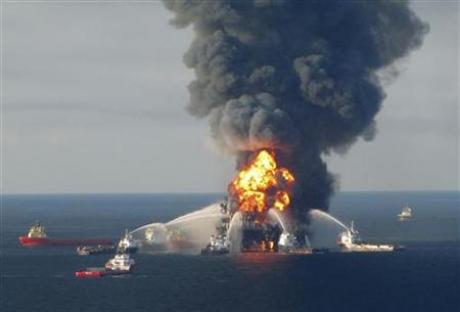Gulf of Mexico spill may hit coast this weekend

(Reuters) - A giant oil slick from a deadly offshore drilling rig explosion could hit the fragile U.S. Gulf Coast shoreline this weekend as the White House and Congress launched separate probes into the worst offshore incident in nearly a decade.
The leaking well, 5,000 feet under the ocean surface off Louisiana's coast, has created an oil sheen and emulsified crude slick with a circumference of about 600 miles, covering about 28,600 square miles (74,070 sq. km), the Coast Guard said on Tuesday. That's slightly bigger than the U.S. state of West Virginia.
Swiss-based Transocean Ltd's Deepwater Horizon sank on April 22, two days after it exploded and caught fire while finishing a well for BP Plc about 40 miles southeast of the mouth of the Mississippi River.
The Coast Guard is using eight underwater robots to try to activate a cutoff valve on the ocean floor to stop the oil flow. The Coast Guard is also weighing a plan to set the oil ablaze where it is bubbling to the surface above the well in an attempt to arrest the spread, starting as soon as Wednesday.
If unchecked, "this could be one of the most significant oil spills in U.S. history," said Coast Guard Rear Admiral Mary Landry, who is heading the federal cleanup effort.
However, the spill is not comparable with the infamous Exxon Valdez disaster, which spilled about 11 million gallons (50 million liters) of oil into the Prince William Sound in Alaska when it ran aground in 1989. BP's well is spewing about 42,000 gallons (190,900 liters) of oil a day into the ocean, the Coast Guard estimates.
It was the worst oil rig disaster since 2001, when a rig operated by Petrobras off the Brazilian coast exploded and killed 11 workers.
London-based BP Plc, which owns the well and is financially responsible for the cleanup, is spending $6 million a day on a massive on-sea clean-up effort that involves dozens of ships and aircraft.
BP announced a doubling of its quarterly profits on Tuesday but investor concern over cleanup costs weighed on the company's shares.
Both BP and Transocean fell under scrutiny from federal and congressional investigators, which on Tuesday announced separate probes.
The Homeland Security and Interior departments launched a joint investigation, with a separate probe unveiled by a subcommittee of the House Energy and Commerce Committee.
"A striking feature of the incident is an apparent lack of an adequate plan to contain the spreading environmental damage," committee lawmakers said in a letter to BP and Transocean executives.
The spill moved toward shore on Tuesday and was 20 miles from the Louisiana coast. A shift in winds could push the spill inland to the Louisiana coast by this weekend, according to forecasters at AccuWeather.
"The wind will nudge the oil slick more to the north-northwest," said Dan Kottlowski, senior meteorologist at AccuWeather. "It might make it onshore over the southeast Louisiana coast first," and later threaten beaches in Mississippi, Alabama and Florida, Kottlowski said.
Charlie Henry, an expert with the National Oceanic and Atmospheric Administration, discounted landfall predictions, because they are beyond the agency's 72-hour accuracy window.
However, Henry said "the Delta region is at risk," including key wildlife habitats in the Pass-A-Loutre Wildlife Management Area and Breton National Wildlife Refuge on the tip of the Louisiana coast, which are teeming with nesting birds.
As the oil spill grows, so does the chance that it will impact efforts by the U.S. Congress and President Barack Obama to open more offshore areas to limited oil and gas drilling.
Obama on March 31 called for a limited expansion of offshore oil and gas drilling in an effort to win Republican support for new proposals to fight climate change.
But Obama's plan left the thorniest issues, such as how royalties that oil firms pay to drill on federal offshore waters will be shared with coastal states, for lawmakers to settle.
A bipartisan group of senators had aimed to unveil a climate change bill on Monday that would have included some offshore drilling expansions. But the plan was called off when Republican Senator Lindsey Graham raised 11th-hour objections related to immigration.
(Additional reporting by Bruce Nichols and Kristen Hays in Houston and Ayesha Rascoe and Jeremy Pelofsy in Washington; Editing by Lisa Shumaker)
© Thomson Reuters 2010 All rights reserved
